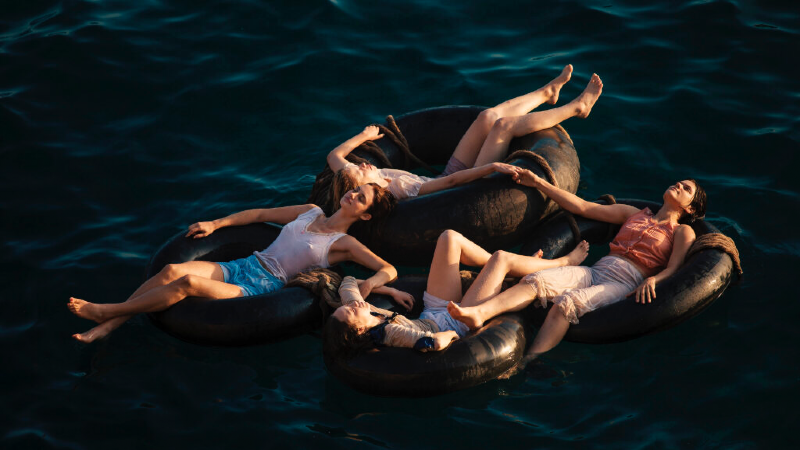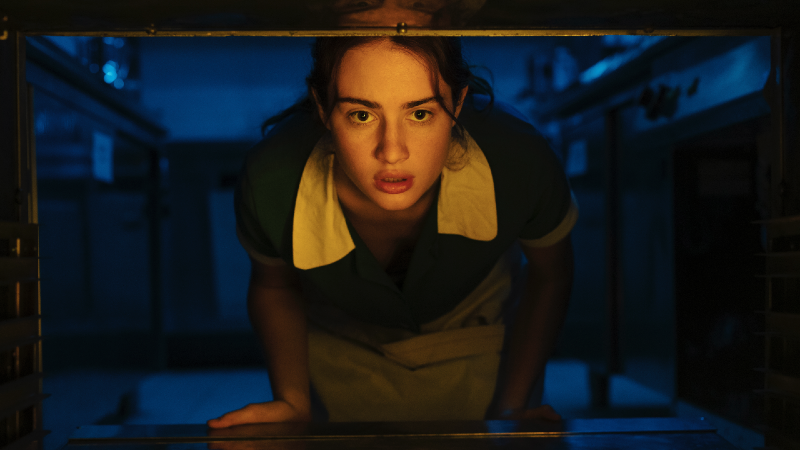Karen Cinorre’s directorial feature debut, the American drama Mayday (2020), premiered at this year’s Sundance and the International Film Festival Rotterdam (IFFR). Her short film Plume (2010), about a boy rescued by an ostrich who finds himself drifting between the human and animal realms, but belonging to neither, foreshadows the themes of her feature film.
At an unnamed seaside venue, an unusual storm complicates preparations for a wedding. When Anastasia (Grace Van Patten), a restaurant server, is asked to go down into the basement to flip the switch after the power has short circuited, sparks fly. She wakes up on a rugged coastline where she meets a group of female soldiers, led by Marsha (Mia Goth), who are fighting an endless war against men. Over the radio they pretend to be damsels in distress, luring the sailors to their deaths. As Ana trains to be a sharpshooter, she comes to realise that she’s not the ruthless killer they expect her to be, and in spite of feeling empowered in this alternate world, she knows she must find a way home.
In conversation with DMovies, Cinorre discussed her directorial debut feature, her feelings of empowerment, and being haunted by the film for many years.
…
Paul Risker – Why filmmaking as a means of creative expression? Was there an inspirational or a defining moment for you personally?
Karen Cinorre – The defining moment that brought me to storytelling may have been hearing Laurie Anderson’s work for the first time when I was quite young. Someone gave me cassettes of her work in the United States, and she was such an incredibly evocative storyteller. She had such a strange but delightful sense of humour, and probably an intelligence that all worked together in this interesting way, I hadn’t heard before.
So that was my inspiration for storytelling, and then when I went to university, I had so many creative impulses. I trained as a dancer, a musician, and I did drawing and painting. I could not get enough of the art making crafts, and I was very lucky to have Lesley Thornton as a teacher and mentor at [Brown] university.
She was such an extraordinary teacher and in her class she pushed out every rule of filmmaking. She let us discover it for ourselves, it was pure discovery. I loved that within filmmaking, and I had this palette of everything I loved. I had dance, music, sound and movement, and the weather itself was part of the palette. After that I was never going back.
PR – ‘What we are’ versus ‘who we feel we are’ can often be out of synch. When did you feel that you could call yourself a filmmaker?
KC – It was really simple. I felt like a filmmaker the first time I opened a Bolex camera and put my hands on the metal inside. I just knew I was in love and I would never let go of that camera.
PR – Could you have imagined that one day you would have made this film?
KC – When I was learning about filmmaking, I definitely imagined myself making films with a large canvas – these “world-building” films like Mayday. This particular story matured and evolved with me over the years because of opportunities and life, and priorities. I would work on it, then I would leave it, and then I would work on it again. It haunted me for many years and then I had an intense period of working on it. I realised that so many of my experiences and also my hindsight on those experiences, was informing how I was writing the film.

PR – Watching Ana’s experiences in the alternate world provokes a sadness, because it reminds us of the impossibility to physically enter our own dreams, and transform our reality.
KC – When you say there’s a sadness to it, do you mean that there’s a sadness that one feels a need to escape, or there’s a sadness that you can’t stay in that place?
PR – Both, because it’s sad to not be able to escape into the imaginary world, but it’s sad that we should want to escape our reality.
KC – [Laughs] Yes, there’s a sadness on both ends. There’s a sadness that one would feel the need for escape, and I think it’s very human. It’s a natural impulse in the modern world and in our psyche, and that’s a fascinating way to move a story along.
There was a sadness in me just writing that she had to leave this world and her friends. They’d shared so much together and I remember thinking it’s a bit like The Wizard of Oz, when Dorothy goes home and they don’t believe she’s done anything. They try to convince her that she never went anywhere, and they tell her she’s crazy. I thought how wonderful it would be for a young woman to make the choice to return to her life and be completely transformed by everything that happened to her. And for her not be told it didn’t happen, that she shouldn’t have left, but for the experience to be joyful because she leaves with such richness. Of course, someone having to leave her friends and move on is sad, and we felt that on set each time one of the actresses would leave. It was sad, but joyful.
PR – If a dream is not real, it does not mean that it cannot empower you or change the way you think and feel. Would you agree that dreams are just as valid as real experiences?
KC – There are some ancient Daoist philosophers, and I read early on these passages about how some of them believed there was no waking and no dreaming. It was one trajectory, it was all the same. You were on the same path and there was no real and unreal. It’s all real, it’s just you’re here and then you’re there. It all has the same validity, there’s no difference. I thought that was intriguing, and why have we created this extreme difference of real and unreal?
It’s maybe real that we go to bed and have these internal thoughts and struggles. I don’t feel the need to discern at all, and bringing them together is actually helpful and empowering. It gives us a deeper mystery and knowledge to what’s happening around us, and inside of us.

PR – As a filmmaker, is there a need to step back and not control the film too much, instead observing what the actors and the film itself gives you?
KC – So much is created and so much happens in filmmaking that’s out of your control. These are human beings, and there are these forces, the weather and tides, and I have no control over it. I can try to steer it and create the most nurturing soil for this story to grow in, and I can do my best to answer questions and write material, but what’s magical about filmmaking is it presents itself to us. Film is its own animal, it’s an organism that grows on its own, and it’s fascinating to be a part of it and to see that.
PR – It’s impossible to tell the perfect story, but is the joy of the pursuit that it’s an humbling experience, because while storytelling will give up some of its secrets, it will never fully reveal itself to us?
KC – I’ve had those thoughts over the years. There are parts of India’s philosophical thought about perfection and how it’s unachievable, but the quest for achieving that is spectacular, and it’s so interesting even in terms of navigation, of having your North Star. You’re not getting to the North Star, it’s a guide. It can be a tyranny if you do become an actual perfectionist trying to make something perfect, because like you said, it’s impossible. I’ve watched films and thought that was perfect, but then there’s always one part that’s not. So you have to let go of the notion that you will ever achieve perfection, but that joy of trying to come together with other people and make it as perfect as it could be, is what the craft is – it’s what drives us. It’s a driver and a notion, but ultimately not an achievable goal.
PR – Do you perceive there to be transformative aspect to the filmmaking process, where you change as a person?
KC – Yes, making a film can absolutely transform you. I always feel that when I do something creative I’m transformed, and usually one main aspect of that is I have two sides of my personality. One is quite shy and one is quite assertive, and the shyness goes away when I’m creating. I’m still very humble, or I hope I am. I feel humble but I become more assertive because you have to create the work, and you do not have a lot of time, and so you have to be fearless. It feels wonderful that you’ve had to be fearless in the face of many challenges, and it’s very empowering to make a piece of work – I would encourage everyone to try it.
Mayday had its World Premiere at Sundance, and its International Premiere at the International Film Festival Rotterdam (IFFR)
Photo Credit: Tjaša Kalkan








